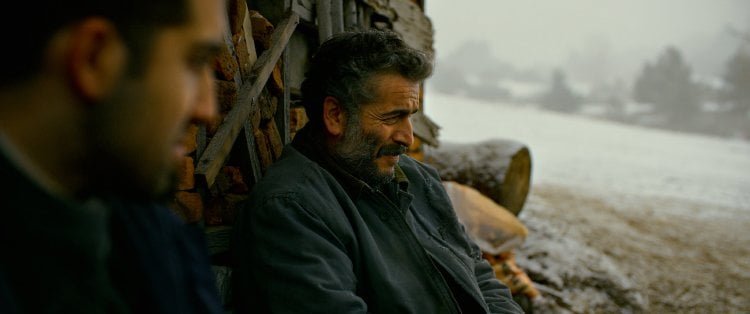The Wild Pear Tree

Returning to his home of Çan from university, Sinan Karasu (Dogu Demirkol) is focused on finding funding for his book, one he is convinced is unlike anything else. But he quickly butts heads with his father Idris (Murat Cemcir), a local schoolteacher whose reputation has gone to ruin because of a late life gambling habit, who immediately demands his son help him dig the well he’s been digging unsuccessfully for years. Sinan’s desire to chart a course different than his father’s leads to confrontations with just about everyone he meets on his journey to publish “The Wild Pear Tree.”
Laura's Review: A-
Turkish director Nuri Bilge Ceylan (“Once Upon a Time in Anatolia”) observed the father/son dynamic used in his latest film when he stopped by a relative’s home in the country and later contacted the man’s son, Akin Aksu, who agreed to put his thoughts to paper. Jumping off Aksu’s manuscript as well as his college writings, Ceylan, his wife Ebru and the young man developed an epic, literary, coming-of-age script. But while much of “The Wild Pear Tree” revolves around the written word and oral debate, Ceylan’s masterful eye, especially for landscapes, ensures his latest is yet another luxuriating, cinematic soak. The first image we see is of Sinan sitting in a cafe across from water whose waves are reflected back upon him, ‘unsettling’ his foundation. He’s not even home yet after his train journey, loaded down with bags, when he’s hit up by a garrulous shopkeeper who slowly makes his way to his point - that Idris Karasu owes him three gold coins. At the infamous well site the next day, Sinan’s Grandmother Hayriye (Özay Fecht) also informs him that another teacher came looking for gold coins lent to her son. Sinan clearly has little use for his father, a man whose transparent mooching is capped with a sneaky, self aware laugh. But Sinan’s own actions prove troubling as well. Aware that even if he passes his teaching exam the odds are against him, he reaches out to an old friend, now a member of the riot police who jokes about taking his aggressions out on protesting students. A visit to Mayor Adnan (Kadir Çermik) lands a whole lot of lip service and no money for work which isn’t related to tourism. On the walk home, Sinan is enticed to a riverbed by Hatice (Hazar Ergüçlü), a beautiful young woman once paired with a friend who now faces a marriage of convenience. A subsequent meetup with that friend, Riza (Ahmet Rifat Sungar), results in a fist fight. A chance spotting of famous author Suleyman (Serkan Keskin) in a cafe turns obnoxiously confrontational, the gracious writer forced to impatience with Sinan and his ‘quirky autofiction meta-novel.’ Later Ilhami (Kubilay Tunçer), the ‘benefactor’ Adnan referred him to, will offer dispiriting words on blind faith, much like the religious debate he’ll have with Imam Veysel (Akin Aksu) - do not question, accept your fate. Ceylan sparingly repeats a piece of Bach throughout, the perfect accompaniment to his visuals. Ceylan sets these pieces exquisitely. As Sinan’s grandmother talks, Grandfather Recep (Tamer Levent) drifts off, gently snoring. Hatice unbinds her hair and the trees whisper their admiration. A stop on a bridge after Suleyman departs suggests an act of vandalism, which, in turn, invites a dream from with the Trojan horse left in Çanakkale from the “Troy” movie set. Veysel and his young Imam Nazmi (Öner Erkan) are found surreptiously stripping a tree of its fruit, the trio’s subsequent debate followed in a long, tracking shot. The filmmaker’s painterly eye for landscapes evokes a nostalgic longing for a country never visited. There are some jagged edges to be found in the film’s final act, the fate of Idris’s beloved dog awkwardly suggested, two differing paths proposed with a fantastical element newly introduced, but Ceylon’s emotional resolution, contrasting the literary appreciation of Sinan’s mother Asuman (Bennu Yildirimlar) with that of his father, proves the best course of a satisfying meal. Grade:
Robin's Review: B+
Sinan (Dogu Demirkol), newly graduated from university, returns home with his freshly written novel. His plan is to get funding to publish book, become famous and leave his one-horse town for good. When he arrives, the first person he meets, the local gold merchant, tells him that his father, Idris (Miurat Cemcir), owes money, a lot of money. Suddenly, his big plans are in jeopardy to publish “The Wild Pear Tree.” Nuri Bilge Ceylan, the director of the 2011 masterpiece, “Once Upon a Time in Anatolia,” delves into the father-son dynamics between the returning prodigal scion and his now-disgraced, gambling-addicted scholar dad. Nothing really “happens” of great consequence, but that is not what the film is about. It is about the life of a family, the conflict between its three generations of the men and the ambitions and pessimisms of youth. “The Wild Pear Tree” is also a study of the passions of youth. Sinan has the ideals and hopes of a young man, but it is also about his disappointments and the growing cynicism in a system that he personally feels is working against him – no one will fund his book. This colors his feelings for his dad, who once was Sinan’s hero but now the subject of the younger man’s disappointment, and anger, especially with Idris and his gambling. Thinking back to my own relationship with my dad, I had many of the same feelings. Some will have a problem with a three-plus hour film but please be patient. Ceylan brings us into a family and we get to experience all of the emotions and conflicts that are part of that family’s life and from all viewpoints.

